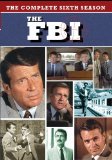| Reviews & Columns |
|
Reviews DVD TV on DVD Blu-ray 4K UHD International DVDs In Theaters Reviews by Studio Video Games Features Collector Series DVDs Easter Egg Database Interviews DVD Talk Radio Feature Articles Columns Anime Talk DVD Savant Horror DVDs The M.O.D. Squad Art House HD Talk Silent DVD
|
DVD Talk Forum |
|
|
| Resources |
|
DVD Price Search Customer Service #'s RCE Info Links |
|
Columns
|
|
|
FBI: The Complete Sixth Season (Warner Archive Collection), The
You want sympathy for your criminal deeds? Look somewhere else, you [fill in the blank]: commie punk / bank-robbing punk / spy punk / extortionist punk / kidnapping punk.... Warner Bros.' Archive Collection vault of hard-to-find library and cult titles has released The FBI: The Complete Sixth Season, a 6-disc, 26-episode collection of the hit ABC crime actioner's 1970-1971 season. To say that absolutely nothing has changed in this sixth season for the increasingly popular Quinn Martin production (this was the show's highest-rated go-around in the Nielsen's), is high praise, indeed, considering the remarkably consistent level of polished, assured storytelling on display here. No extras, thoughh--can't someone at Warner's get on the horn with suave Efrem Zimbalist, Jr., and wrangle a five minute interview with him for one of these sets?--for these good-looking fullscreen transfers (click here for my interview with the actor).
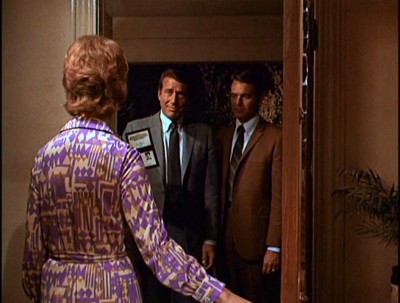
Washington, D.C., 1970. FBI Inspector Lewis Erskine (Efrem Zimbalist, Jr.) is on the line with Arthur Ward (Philip Abbott), Assistant Director of the Federal Bureau of Investigation (second only to the Director, J. Edgar Hoover). Whatever personal life Erskine may have (and it's not entirely certain that he does because we never see it...), he can forget it because he's been given another assignment. Investigating federal crimes ranging from interstate fugitives to foreign spies to industrial saboteurs to murderous bank robbers, Erskine is often paired with Special Agent Tom Colby (William Reynolds), a young agent who is also selflessly devoted to the Bureau. Devoid of outside interests, Erskine and Colby grimly go about their work--unsmiling and largely unmoved by any extenuating circumstances for either criminal or victim--protecting the United States from its enemies.
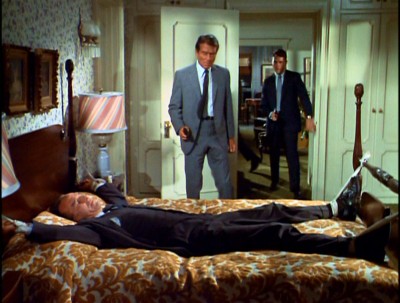
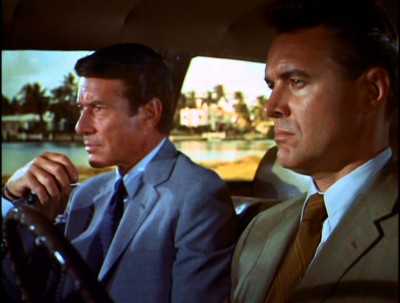
For some reason, it seems I'm only receiving every other season of The FBI to review for DVDTalk now, so I missed out on Season Five. However, I'd lay down a hundred smackers that it didn't differ in any significant way from the previous Season Four or this sixth go-around...which is excellent news for lovers of straight-ahead, noir-tinged true-crime storytelling (well...sorta "true crime;" there's a disclaimer in the end credits that pretty much admits most of these stories are created out of whole cloth). And owing to that finely-crafted "reliably repeatable experience" that The FBI excels in (as so many other 60s network dramas and comedies were able to do, too), I don't think I can add anything more pertinent about the series' general aesthetics to what I've already written in my previous reviews: lean, carefully-structured scripts, efficient, exciting, no-nonsense direction, a charismatic lead performance by Efrem Zimbalist, Jr. anchoring the anthology aspects of the show's construction, an impressive roster of Hollywood's best supporting players, and production values that rivaled TV's big-screen counterparts at that time, all combined to deliver socko entertainment. So in the spirit of the show's no bullsh*t approach, let's skip the opening chatter and look at the episodes in this sixth season of The FBI.
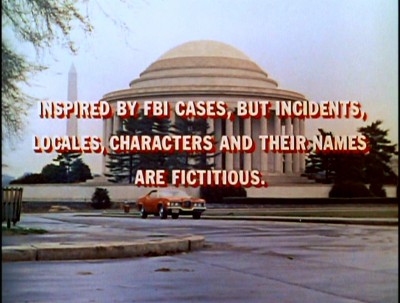
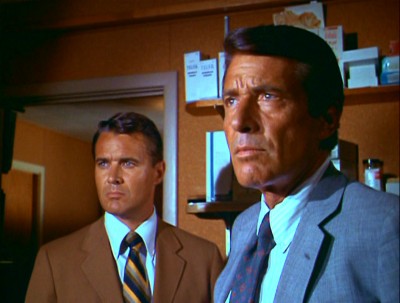
In the season opener, The Condemned, director Virgil W. Vogel, a series' regular, expertly fashions a tense little noir study playing off the classic crime triangle of two hoods (a sweaty Martin Sheen and the excellent, sorely underrated Tim McIntire) whose unusually tight emotional bond is torn apart by a scheming minx (sexy as hell Joan Van Ark, in an uncharacteristic tough cookie role). Check out the "high tech" 16mm footage of the bank robbery...too bad the bank didn't think of putting in mics, too; the FBI has to hire a lip-reader for clues! Director Vogel is especially good with action sequences, and there's a nice one here at the end, when an underground tunnel chamber is flooded during a chase. It's unfortunate that the fine actress, Antoinette Bower, isn't given more to do in The Traitor, but it's good to see Bradford Dillman in anything (he does a fine job here as a pressured engineer turned industrial spy), while fav Wayne Rogers is excellent playing a slick, slimy espionage conduit (the smooth, talented Rogers--particularly effective at shady characters--should have had a much bigger on-screen career). Escape to Terror is a slick take on a familiar mob story: James Olson is a CPA who knows too much for his own good. Amusingly, every name in the book is used here for the mob--"La Cosa Nostra," "The Organization," "The Commission," and "Mafia"--while character names like "Jack Diamond" and "Nick Irish" sound about as Sicilian-like as "Jane Withers" and "Shirley Temple" (no surprise here, considering the networks were long-loathed to potentially offend anyone in connection with depictions of mob activities). Much better is The Architect, a cold, grim noir outing about brilliant, escaped sociopath, Monte Markham and his ruthless desire to self-destruct. Markham, another underrated television actor, is first-rate here (when a potential victim warns he could possible OD in his sleep, Markham icily replies, "That's a nice way to go,"), as is Billy Dee Williams as his partner who can't help but care about him, and personal fav Dabs Greer, exceptional as always, as a doomed robber (when Williams, having squealed to the Feds, tells a wounded, captured Markham, "I saved your life," Markham, nihilistic to the end, flatly intones, "You didn't do me a favor,"). A crackerjack noir.
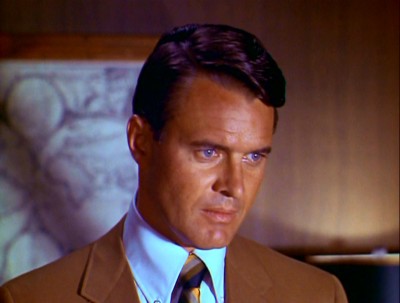
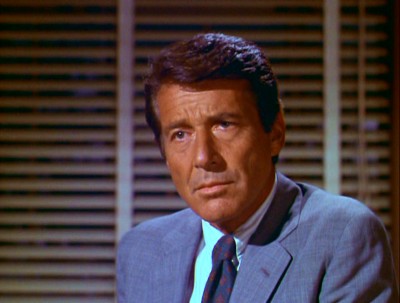
Overly-familiar The Savage Wilderness--crazy Don Stroud loves Darleen Carr so much he kidnaps her in the untamed Pacific Northwest forests--benefits from some convincing Northern California location shooting and Stroud's (another favorite) creepy, mumbling performance. Some might watch The Savage Wilderness and conclude the final act is nothing more than a commercial for Ford's sweet, sweet 1970 Bronco (The FBI's sponsor)...and that's fine with me (as much as I love seeing those babies in action, nothing compares to the hilarious sight of completely unmoved Zimbalist, Jr. and Reynolds registering zero sympathy for Carr's boyfriend when he blames himself for not being able to defend her against hulking Stroud). The soon-to-be passe "relevancy" movement that was momentarily gripping network programming rears its ugly head here in Time Bomb, where a Weather Underground-like terrorist cell plots "the Revolution" via bombing federal buildings. One-time hopeful Wayne Maunder overacts to the point of laughter, while the rest of the atypically no-name cast fails to impress, either. Zimbalist, Jr. gets the episode's biggest laugh, however, when asked if a clue--a Bible quote--means anything to him: "I doubt it...everyone quotes the Bible." This being The FBI, the revolutionaries are thwarted at the last second, of course, when Zimbalist, Jr. walks the bomb out of a crowded building with seconds to spare, and the spoiled, politically naive dupes are arrested (don't worry, though...the Marxist terrorist ringleader eventually "rehabilitates" himself to the point where he helps write America's school curriculums while launching a best friend and future President's political campaign, right in his own living room!). The Innocents features two of the 1960s finest actors--Lois Nettleton and Larry Blyden--in what unfortunately turns out to be a thoroughly routine kidnapping story (a shame to waste these actors in this by-the-numbers suspenser). The Deadly Pact, with its story about the Mafia targeting black businessmen, would seem a likely "relevancy" candidate, as well; however, it doesn't delve too deeply into politics, sticking closer to a traditional take on its mob extortion plotting (Hari Rhodes and particularly Ivan Dixon, in a strong performance, are very good here).
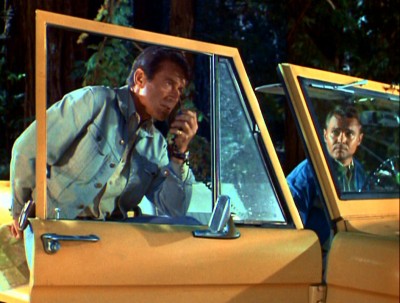
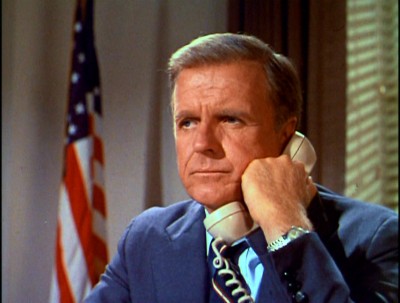
The Impersonator is a fairly standard outing concerning conman Stuart Whitman (miscast) who becomes violent when his latest victim, Mariette Hartley, stumbles on his secret (pro Kent Smith is wasted here as her father). Antennae of Death, however, is a beautiful little noir featuring a puffy, sweaty William Shatner as a junkie who just wants a home cooked meal now and then at kindly Bettye Ackerman's rooming house. Astrid Warner does well as Ackerman's sexy teen tramp daughter, while the suspenseful direction is boom boom boom. A winner, with a classic FBI coda where perp and victim meet in Zimbalist, Jr.'s office for one last guilty, shameful glance at each other (love it when they do that). The Target features nice turns from Eric Braeden (super-slick) and Bond villain Karin Dor in this well-paced spy outing (weird to see one-time leading man John Kerr do an anonymous walk-on bit here). The Witness features two strong performances from Murry Hamilton (as a businessman pressured by the mob) and Roger Perry (another relatively unsung TV actor I always enjoy seeing) as the most nattily-attired, WASPish Mafia enforcer you ever saw (amusingly, according to The FBI, the Mafia out there resembles not so much Goodfellas as it does The Man in the Gray Flannel Suit). Scipter Mark Weingart reworks The Petrified Forest for helmer Bernard McEveety in the enjoyable Incident in the Desert, with Dabney Coleman in the Leslie Howard role (rather than a suicidal romantic, he's a romantic drop-out, tired of the "system," man), and crazy Steve Ihnat in the Bogey role (overplaying exactly the way we want him to). Super cast here, including Paul Carr, Paul Fix, little Clint Howard, Ross Hagen, and beautiful Corinne Camacho. Wonderfully shifty Ray Danton does well in The Inheritors, playing a con man who meets his match with grifter Suzanne Pleshette (of course she's sexy as hell...what else would she be?). The Inheritors's storyline, from Alvin Sapinsley, may be familiar, but it's put over with some dash here, while one of my favorite moments from the entire FBI series occurs at its end. Kindly, understanding Gene Raymond, the pigeon target of Pleshette's lies, limply tries to explain away her deliberate criminal behavior to unforgiving, intractable senior FBI Inspector Lewis Erskine, with this typically soft, Freudian, liberal justification: "I think [Pleshette] turned to crime because she thought the only way to stop people from using her was to use them first....does that make any sense to you?" to which Zimbalist, Jr., with a pitying, contemptuous look, flatly replies, "I think you know it doesn't." Boom! Liberal feel-good moral equivalency is smacked down by absolute, old-fashioned black and white Puritan judgementalism. God that's a bracing blast from the past from the final dying days of an America that at least still paid lip-service to expectations of its people being ethically and morally self-accountable.
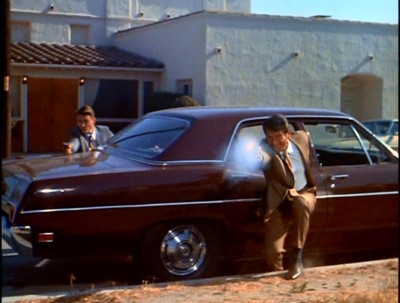
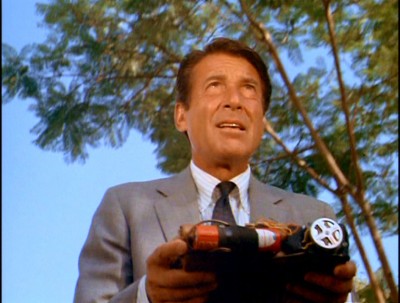
Solid performers Tom Skerritt, Fabian (yes, that Fabian), and fav Woodrow Parfrey (not at all amusing in this outing) put Unknown Victim across in this kidnapping-gone-wrong story that benefits from a suspenseful cat-and-mouse finale in a decrepit movie palace. The Stalking Horse is a reliable industrial/international espionage entry, with Steve Forrest (always better playing flawed, pressured characters) doing well as an executive whose mistress, Diana Hyland, is in league with the Rooskies. Center of Peril gets an immediate jolt of energy from the vicious, violent undercurrent Vic Morrow always brings to his roles--this time, he's a middle man for art thieves Gary Collins and Susan Howard (did Morrow ever play any light comedy roles???). Zimbalist, Jr. gets to go undercover in this one, posing as an art expert, generating a nice bit of suspense at the end as we wonder if he'll pull off the ruse. Director Virgil W. Vogel scores with another solid actioner, Eye of the Needle, where famous surgeon Richard Kiley, hiking in the Oregon wilderness before a failed kidnapping plot leaves him wounded and on the run, has to fight back against his pursuer (plenty of smart detail in this rugged entry). The Fatal Connection is another admirable B noir that The FBI does so well, with Dana Elcar and Sorrell Booke stealing the show as conspirators in a complicated story about a crusading columnist (Andrew Duggan) and the snitch who will get him killed (Scott Marlowe brings some Method-y touches to his jumpy role as a would-be assassin). And in The Replacement, The FBI is dragged into the 70s when Zimbalist, Jr. dons a porn-worthy 'stache for his undercover role as a Soviet intelligence officer in an enjoyably convoluted Cold War thriller featuring good performances from Charles Korvin and Phyllis Thaxter (yes...Superman's mother is a Commie pinko spy).
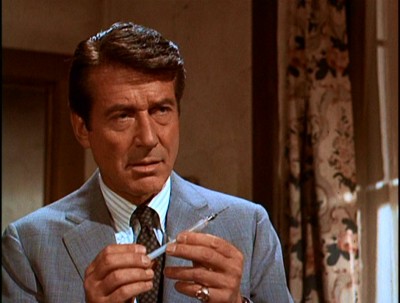
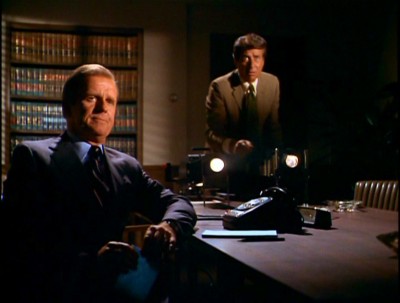
Death Watch, on the other hand, is a rather routine outing (gun running), enlivened only by the sight of the now-incongruous pairing of TV actor Glenn Corbett (dull as ever) and a young Diane Keaton (still manages to intrigue in a nothing role). Future goddess Angel Thompkins (need I say more than The Teacher?) is distressingly nice here, however. Pity. Downfall is a tense little nail-biter about jewel thief and human fly Michael Burns' efforts to disengage himself from crooked patron Carl Betz (wonderfully scuzzy here with that ridiculous rug), while keeping his girlfriend--Betz's daughter, Anne Archer. Some first-class, big-screen worthy mock-ups of Burns crawling around some vertiginous ledges compete (and lose) with the sight of delectable Archer in skin-tight low-rise hip-huggers and a cropped top. A top-notch little noirish gem here. With just a few added shots of nudity and violence, The Hitchhiker could have been released as a drive-in exploiter, with a jangly Michael Douglas playing a crazy AWOL Army private robbing banks to make himself famous. Lovely Donna Mills as a free-spirited hippie is along for the ride, before blurry Skip Ward shows up as the leader of a small biker gang who involves himself in Douglas' doomed plans (AIP could have made some dough on this with just a few titillating inserts). A superior noir outing, Turnabout, could have made it just fine on the bottom of a 50s crime double-bill, with no embellishments at all. Warren Oates and Joyce Van Patten make a touching pair as the doomed couple on the run, when Oates' armoured car robbery yields surprisingly big results. Nice unexpected twists and turns here (Oates is a lot smarter than his bosses think), with Oates yet again proving himself one of the most compelling actors of the 1960s and 1970s with this (probably) forgotten performance (having grown up outside of Toledo, Ohio...I can assure you that the "Toledo, Ohio" amusingly photographed here--complete with mountains and desert scrub--is not what you'll find, should you have some possible reason to go looking for it, when you take a right off I-75 North).
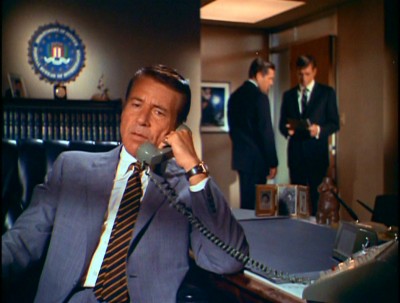
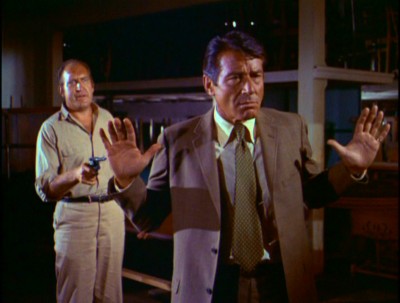
The Natural, despite an excellent cast, including Peter Mark Richman (always good), Vic Taybeck, and Jesse Vint, is a pretty standard sports corruption story that should have been a lot tighter. Luckily, this sixth season ends on a high note, with the final entry, Three-Way Split, scripted by Gerald Sanford and directed, if I'm not mistaken, by The FBI's own Philip Abbott, achieving a remarkable facility in delineating its noir conventions. A fractured, three-way story about three criminals--Peter Haskell, Richard O'Brien, and Albert Salmi--and their doomed efforts to escape their certain, crushing fate, Three-Way Split relentlessly, with a steady, dreadful drumbeat, paints a picture of romantic futility for these wistful bank robbers that goes against The FBI's usual grain of, "Screw the criminals' desires and fears." Haskell's grim efforts to win back his old girlfriend include "buying out" her disapproving father (Lex Barker, in a surprisingly good turn)...but it won't matter in the end. Same with Salmi, whose aims are lower--a nice car and pretty girl--but whose comeuppance is just as certain (his girl takes him for a ride). Most pathetic of all is O'Brien, who only wishes for a small hardware store in New England; when Abbott shows how happy O'Brien is at the welcoming lunch he receives from the town's Chamber of Commerce (Edward Andrews, perfectly cast), we know it's only a matter of minutes before everything will come crashing down for him (the wistful look on his face, as he watches the window painter letter-in his name on the store he knows he's going to lose, is an inspired bit of staging by Abbott). A minor masterpiece of noir dread and fatalism, Three-Way Split is about as good as it gets for The FBI; it's a deceptively unassuming, impressive achievement for a show that routinely delivers the goods.
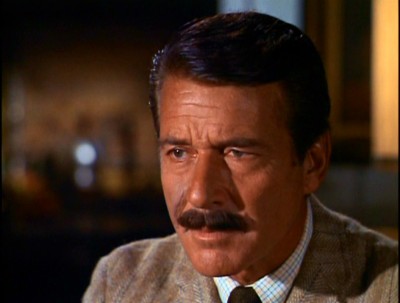
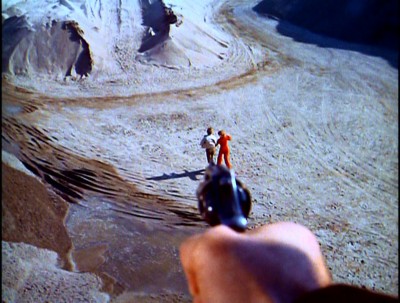
The FBI delivered the goods ratings-wise, too, in this sixth go-around. Secure in its Sunday 8:00pm timeslot, it didn't receive much help from its new lead-in, ABC's "relevant" period misfire, The Young Rebels, but it did have an attractive lead-out, The ABC Sunday Night Movie, which landed at 28th for the year. Competition over on CBS had all but disappeared, with once-popular ratings hits Lassie, Hogan's Heroes, The Ed Sullivan Show, and The Glen Campbell Goodtime Hour (as well as newcomer fizzle, The Tim Conway Comedy Hour) all disappearing this year from the coveted Nielsen Top Thirty. Only the last half-hour of NBC's Wonderful World of Disney (13th for the year) gave The FBI a fight (one-shot ratings hit The Bill Cosby Show, at 8:30pm, slid out of the Top Thirty, as well), with The FBI winning, coming in at the substantial 10th place slot in the year's most-watched series' rankings--its highest rating in six years.
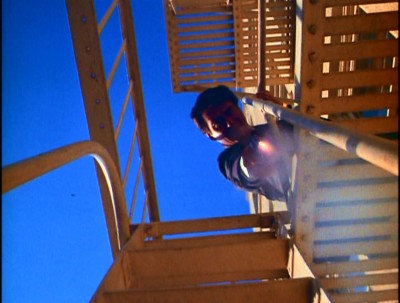
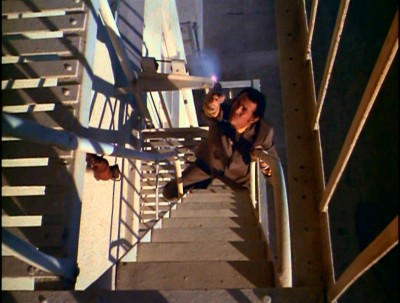
The DVD:
The Video:
The fullscreen, 1.37:1 color transfers for The FBI: The Complete Sixth Season look improved over the last season I reviewed. Color generally good (perhaps a tad faded here and there), the image is sharp, and aside from occasional speckling, no compression issues to speak of here.
The Audio:
The Dolby Digital English mono audio track is acceptable, with a minimal amount of hiss, and no subtitles or closed-caption options.
The Extras:
No extras for The FBI: The Complete Sixth Season.
Final Thoughts:
Consistently entertaining crime actioner, superiorly crafted. Some series' best episodes in this go-around, including Turnabout, with a remarkable performance by Warren Oates, and Three-Way Split, the best little noir thriller you probably never saw (or don't remember). I'm highly, highly recommending The FBI: The Complete Sixth Season.
Paul Mavis is an internationally published movie and television historian, a member of the Online Film Critics Society, and the author of The Espionage Filmography.


|
| Popular Reviews |
| Sponsored Links |
|
|
| Sponsored Links |
|
|
| Release List | Reviews | Shop | Newsletter | Forum | DVD Giveaways | Blu-Ray | Advertise |
|
Copyright 2024 DVDTalk.com All Rights Reserved. Legal Info, Privacy Policy, Terms of Use,
Manage Preferences,
Your Privacy Choices | |||||||









